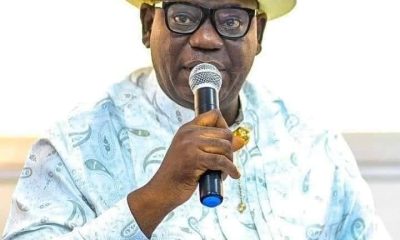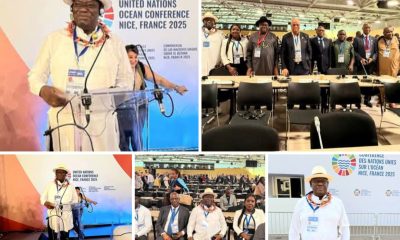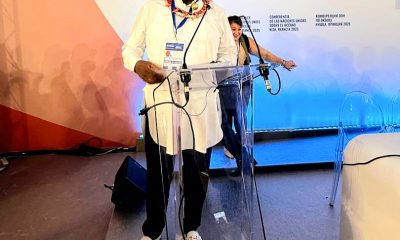Breaking
Breaking: Rivers Political Crisis: INC Spits Fire Over Post-Supreme Court Judgment Uncertainties
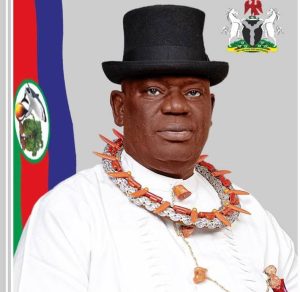
By Admin
The Ijaw National Congress (INC) has condemned in strong terms the recent Supreme Court ruling on the Rivers State political crisis, warning that it could lead to widespread instability in the Niger Delta.
2. The INC, through its President, Prof. Benjamin Okaba, declared that the judgment failed to acknowledge the historical and political sacrifices made by the Ijaw people in Rivers State’s governance, adding that any attempt to undermine Governor Siminalayi Fubara would have dire consequences for national peace and economic stability.
3. Tracing the roots of political dynamics in Rivers State, the INC emphasized that the Ijaw people have played a crucial role in shaping the state’s leadership for decades. According to Prof. Okaba, in 1999, an Ijaw leader, Chief Marshall Harry, was instrumental in securing the Peoples Democratic Party (PDP) ticket for Dr. Peter Odili, despite a formidable challenge from Sergeant Awuse. Harry further ensured Odili’s victory against a Kalabari opponent, Chief Ebenezer Isokariari of the All Peoples Party (APP).
4. In 2003, the INC recalled that when Marshall Harry backed Sergeant Awuse’s governorship ambition, it was not Awuse but Harry himself who was assassinated, marking a painful loss for the Ijaw people. By 2007, Ijaw leaders such as Soboma George and Farrah Dagogo played a decisive role in securing victory for Sir Celestine Omehia, while Prince Igodo, a Kalabari-Ijaw warlord, was killed during Omehia’s swearing-in to prevent security breaches.
5. Similarly, in 2011, when Rotimi Amaechi sought to nominate Pastor Tonye Cole as a minister, Dame Patience Jonathan, the wife of then-President Goodluck Jonathan, ensured that Nyesom Wike took the slot instead. The INC lamented that despite these consistent sacrifices by the Ijaw people, an Ikwerre political elite now seeks to frustrate the first riverine governor in decades.
6. The INC did not mince words in its warning to the federal government. The body stated that the Ijaw people will defend Governor Fubara “with every pint of blood in their veins”, emphasizing that they would not stand by and allow their long-awaited tenure to be truncated
7. Prof. Okaba also cautioned that while the INC has worked tirelessly to preserve peace in the Niger Delta, leading to increased oil production and revenue for the nation, regrettable, the same resources are now being used to marginalize the Ijaw people.
8. He specifically pointed out that this trend extends beyond Rivers State to Ondo, Edo, Delta, and Akwa Ibom, where Ijaws continue to face political exclusion.
9. Issuing a direct warning to President Bola Ahmed Tinubu, the INC insisted that the ongoing political crisis in Rivers State must not be treated as ordinary politicking. Prof. Okaba stressed that the Ijaw people, numbering over 40 million worldwide, would not tolerate any attempt to undermine their place in Nigerian politics.
10. He further stated that while the INC enjoins Gov. Fubara to in the spirit of sportsmanship work with all duly constituted arms of government in the State, if Governor Fubara’s tenure is truncated by the Amaewhule-led Assembly or anybody else, the INC cannot guarantee the sustenance of the current peace in the Niger Delta, nor the continued rise in oil production—a veiled warning of potential disruptions in the region’s petroleum industry.
11. With the INC’s firm stance, tensions in Rivers State are expected to escalate if urgent steps are not taken to resolve the political crisis amicably. Stakeholders now look to President Tinubu and other national leaders to navigate the unfolding situation carefully to avoid plunging the oil-rich region into chaos.
12. As the political battle unfolds, one thing remains clear—the Ijaw National Congress has drawn the line, and any further attempts to sideline Governor Fubara may come at a heavy price.
Breaking
Breaking: INC Condemns Violence, Push for Peace over Letugbene-Ogbotobo Communal Feud
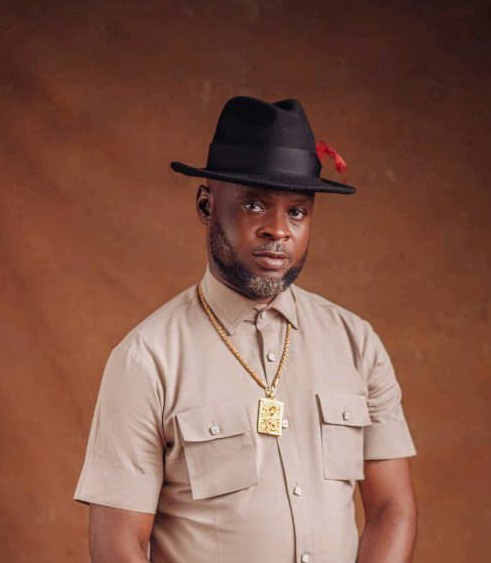
… Warns Against Land-grabbing
Following recent tensions over land and oil wells, the Chairman of the Ijaw National Congress (INC), Iduwini Clan, Chief Benson Dodoru, has called for peace between the Letugbene and Ogbotobo communities in Ekeremor Local Government Area of Bayelsa State.
In a statement delivered through the INC’s legal adviser, Amb. Jeremiah Charles Ikpaka, Chief Dodoru condemned the recent actions of Letugbene youths, who took the law into their own hands by destroying structures allegedly built by Ogbotobo settlers on Letugbene land. He described the act as “uncivilized,” though born out of provocation.
According to the INC Chairman, the root of the conflict lies in attempts by Ogbotobo community members, allegedly backed by SPDC and Renaissance Africa Energy Company Ltd, to claim five oil wells located in Letugbene territory.
Dodoru accused SPDC of instigating the crisis under the pretence of planting mangrove trees, calling the claim “laughable.” He warned that if SPDC does not withdraw its activities and stop interfering in community lands, Letugbene may be forced to shut down all SPDC operations in the area.
While condemning the violent response by the youths, Chief Dodoru emphasized the need for peace and warned neighbouring communities and corporate entities to stop all land-grabbing efforts. He urged both communities to remain calm and allow the local government’s peace process to continue.
“Letugbene, Iduwini Kingdom is not afraid of war, but we want peace. Ogbotobo people are our Iduwini children. Fighting each other will only lead to loss of lives and property”, Dodoru said.
Breaking
Breaking News: Governor Sim Fubara Returns Government House Amid Renewed Hope and Seaming Uncertainties

Favour Bibaikefie
River State Governor, Siminalayi Fubara, has made a low-profile return to the Government House in Port Harcourt, quietly stepping back into the state’s seat of power after nearly three months away. His reappearance marks a turning point in what has been one of the most turbulent political episodes in the State’s recent democratic history-one characterized by federal intervention,
constitutional debates, and widespread public concern.
The political standoff began on March 18, 2025, when President Bola Ahmed Tinubu declared a six-month state, citing a breakdown in political stability and warning of a looming constitutional crisis. The decision saw the suspension of Governor Fubara, his deputy Dr. Ngozi Odu, and all members of the Rivers state House of Assembly. By the next day, Fubara had vacated the Government House under tight security, retired Vice Admiral Ibok-Ete Ibas as sole administrator. The usually lively Government House soon became a fortress-guarded by federal troops and ringed with armoured vehicles-cut off from the public and symbolic of a centralised command.
Despite this, everyday life in Port Harcourt continued, though a quiet disquiet settled over residents concerned about democratic backsliding, a lack of representation, and the uncertain future of their state.
That uncertainty shifted on June 4 when Governor Fubara was discreetly seen entering the Government House, this time with fewer aides and a smaller security team. There were jo press briefing or official ceremonies-but his presence sent a clear signal:Fubara was back in office.
According to sources close to the matter, his return followed delicate negotiations between federal representatives and respected elders from Rivers State. Although the state of emergency remains officially in place until September, a “soft transition ” has reportedly been agreed upon. Under this arrangement, Vice Admiral Ibas continues in his role as federal liaison, but Governor Fubara is expected to resume key Governance duties, particularly in administration and budgeting.
In a brief conversation with our correspondent shortly after settling back into his office, Governor Fubara expressed a spirit of reconciliation:
We are here to prove a point. We are here to continue the work the people elected us to do. This house does not belong to me. It belongs to River people, and I’m just a servant.”
Nonetheless, the governor returns to a changed political climate.The stated assembly remains inoperative,it’s activities halted under emergency conditions. Political analysts anticipate a battle for authority and legitimacy once the legislature resumes.
Meanwhile, many major infrastructure projects and financial decisions have been on hold since March, with federal officials temporary managing sate funds. Remaining control over the state’s finances is expected to be one of Fubara’s top priorities.
Adding further complexity is the continuing political influence of former governor Nyesom Wike-now serving as Minister of the Federal Capital Territory-and the main adversary of Fubara. Wike’s loyalists within the State Assembly are likely to resist any moves by Fubara to fully consolidate power.
At the same time, civil society groups and youth-led organisations are beginning to mobilize, calling for greater accountability and demanding a definitive end to the emergency rule.
Governor Fubara’s return is being viewed by many as both a comeback and a test of political durability. The road ahead is filled with procedural ambiguities, institutional resistance, and the unresolved tension of recent months.
Yet, despite the uncertainty, there’s a cautious sense of renewal-a belief that governance in Rivers State might, once again, align itself with the will of its people rather than the pressure of political power.
As the sun sets over the palm-fringed lawns of the government house, it’s lights shines once more-signalling not just Governor Fubara’s return, but the beginning a new and uncertain chapter in the state’s unfolding political drama.
Breaking
Breaking: Nigerian Navy Uncovers 12 Illegal Crude Oil Bunkering Sites in Delta Community

By Divine Perezide – IduwiniVoice
In a significant breakthrough, the Nigerian Navy has uncovered and dismantled 12 illegal crude oil bunkering sites in Obodo, an Itsekiri community near Omadino, Warri-Southwest Local Government Area if Delta State.
The operation, which took place on Sunday, June 1, 2025, was conducted by personnel of the Nigerian Navy Ship (NNS) DELTA under the Operation Delta Sanity, a renewed military campaign aimed at ending oil theft and Illegal bunkering in the Niger Delta.
According to the Navy, the discovery consisted of “12 Illegal dug-up pits filled stolen crude oil strategically hidden within the community. While the exact volume of the recovered crude has not yet been disclosed, the operation represents a major step forward in the Navy’s continued efforts to clamp down on economic sabotage and safeguard national assets in the region.
“This action is part of the Nigerian Navys intensified efforts to curb Illegal bunkering and protect national assets in the Niger Delta,” the Navy said in a statement issued after the raid via their Facebook account.
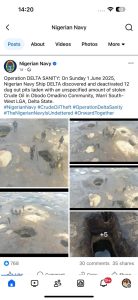
The Navy emphasized its resolve to continue pushing forward against those involved in the criminal extraction and sales of Nigeria’s oil resources. “The Nigerian Navy reiterated its commitment to remaining undeterred in its fight against crude oil theft, vowing to sustain operations in all hotspots of the region.” The statement added.
The dismantling of these Illegal sites marks one of the latest efforts under Operation DELTA SANITY, an initiative that has seen a surge in maritime security activities and interdiction of illicit oil operations in the creeks and communities of southern Nigeria.
As investigations continue, the Navy has urged residents to cooperate with security agencies by reporting suspicious activities to help maintain peace and economic integrity in the Niger Delta.

